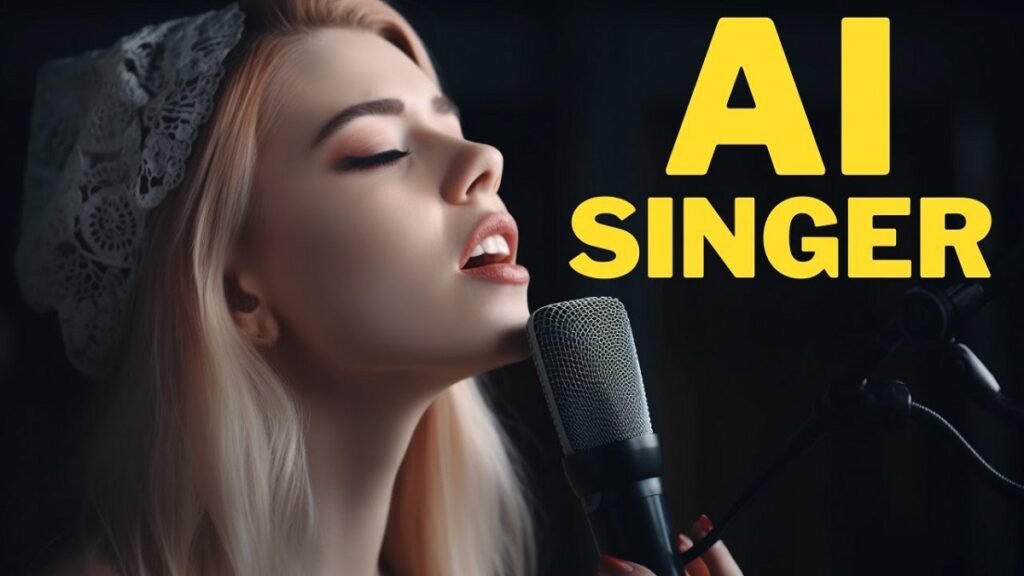You can immerse yourself in your favorite tunes reimagined by YouTube AI Singer. Through the innovative Dream Track generative AI tool, you can experience the mesmerizing replication of your favorite singer’s voice. YouTube has unveiled an innovative feature set to transform music creation by allowing users to generate AI-based songs using the licensed voices of renowned artists like Demi Lovato, John Legend, Troye Sivan, and others. This announcement arrived shortly after YouTube updated its policy, mandating users to disclose AI-generated content.
Dubbed “Dream Track,” this YouTube AI Singer marks an experimental phase limited to a select group of creators, facilitating the creation of 30-second tracks from a pool of about nine artists’ voices. However, even the artists themselves exhibit mixed sentiments regarding this technological leap, expressing cautious yet intrigued attitudes.
Troye Sivan remains cautious about AI’s future but expresses excitement and curiosity about the creative evolution this experiment might lead to. Similarly, Charli XCX acknowledges caution but expresses interest in witnessing the outcomes of this AI-driven innovation.
On the other hand, artists like John Legend embrace the opportunity, stating their contentment in participating. Demi Lovato adopts an open-minded and hopeful stance, anticipating a positive and enlightening experience through the collaboration with Google and YouTube.
Key artists, including Charli XCX, Charlie Puth, Troye Sivan, and Sia, have granted YouTube permission to “clone” their voices for user-generated songs, accessible through a simple text prompt. Presently, this experimental YouTube AI Singer tool is exclusive to around 100 users, prompting a significant debate within the music industry about the potential and drawbacks of AI.
Although seemingly limited in scope, the involvement of notable artists who voluntarily signed up for this venture amplifies its significance. This bold introduction of a controversial technology highlights the contrasting views within the music industry regarding AI’s adoption.
While generative AI continues its ascent in the music domain, this tool’s anticipated functionality—allowing users to emulate their favorite artists’ voices in videos—faces a delay. Negotiations with major record companies like Universal Music Group, Sony Music Entertainment, and Warner Music Group for artists’ voice rights have postponed its release.
YouTube, acknowledging AI’s vast potential and the complexities it poses, pledges commitment to collaborate with music industry partners. Presently, the YouTube AI Singer utilization is limited to soundtrack videos on YouTube Shorts, available to a restricted group of creators in the US.
The company has showcased two sample videos using Dream Track, featuring imitations of Charlie Puth and T-Pain. The result of YouTube AI Singer feels like a low-quality MP3, full of digital artifacts.
Concerns loom over potential misuse, including misinformation spread or unauthorized impersonation, raising challenges in persuading artists to participate amid the regulatory uncertainties surrounding AI technologies.
Besides, YouTube AI Singer, What other AI Tools are Developed by YouTube?
YouTube, the forefront of digital video content, is spearheading innovation in content creation through the development of a range of Artificial Intelligence (AI) tools. These tools, designed to streamline and enhance the content creation process, aim to empower creators across various skill levels.
AI Insights
This tool harnesses audience data to generate novel video ideas tailored to creators’ audiences, fostering a symbiotic connection between content and viewership trends.
Dream Screen
Designed exclusively for YouTube Shorts, Dream Screen unleashes generative AI capabilities, enabling users to craft bespoke backgrounds by inputting prompts, thus infusing Shorts with unique visual elements.
Assistive Search in Creator Music
Simplifying the quest for the perfect soundtrack, this tool intelligently suggests suitable soundtracks, complementing creators’ videos seamlessly.
Aloud
Bridging language barriers Aloud emerges as a dubbing tool that effortlessly translates videos into diverse languages, expanding content accessibility across global audiences.
YouTube Create
A mobile-centric editing app tailored for YouTube Shorts videos, encompassing a suite of editing tools including trimming, automatic captions, voiceover recording, and a repository of royalty-free music integrated with beat-matching technology.
AI-enhanced backgrounds for YouTube Shorts
An integral facet of Dream Screen, this feature augments Shorts with AI-generated backgrounds, elevating visual aesthetics.
AI-guided soundtrack selection
A component of Assistive Search in Creator Music, this AI-driven tool enhances the process of selecting and integrating soundtracks into videos.
Announced amidst the “Made on YouTube” event, these pioneering AI tools are slated for release by early next year. Their collective objective is to democratize content creation, fostering an inclusive ecosystem that caters to creators of varying expertise levels.
What are Other AI Tools to Clone Singer’s Voice
Apart from the YouTube AI Singer tool, the AI world has various tools dedicated to cloning singers’ voices, showcasing a diverse array of innovative solutions:
ElevenLabs’ AI text-to-speech tools
Offering self-voice cloning capabilities, the ElevenLabs tool facilitates the creation of voice clones through a guided software walkthrough.
FineShare
This platform offers an AI-powered voice changer, enabling users to transform their voices into over 110 realistic voices of characters and celebrities, enhancing creativity in vocal expression.
Soft Voice Cloning VITS (So-VITS-SVC)
As open-source software, So-VITS-SVC leverages AI-driven deep learning to process vocals, converting vocal recordings into the trained singing voice with remarkable precision.
Respeecher and Murf.ai
Renowned models in the voice cloning sphere, these platforms offer advanced voice cloning capabilities, contributing to the expanding landscape of AI-powered voice manipulation.
Voice-Swap
Empowering legal voice swapping, Voice-Swap utilizes AI to enable users to interchange their singing voices with those of partnered chart-topping artists, fostering innovative musical collaborations.
While these AI tools present intriguing possibilities, it’s paramount to wield them responsibly, acknowledging and respecting privacy and rights. Prioritizing permissions and ethical usage remains imperative, ensuring the ethical and lawful utilization of these cutting-edge Artificial Intelligence technologies.
Naorem Mohen is the Editor of Signpost News. Explore his views and opinion on X: @laimacha.

